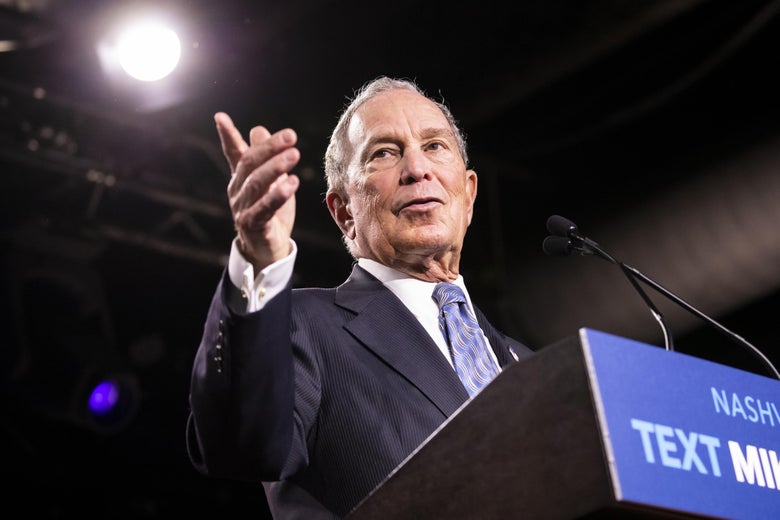
WTF Mike?
Brett Carlsen/Getty Images
Mike Bloomberg has terribly misguided beliefs about what caused the 2008 financial crisis, which should probably disqualify him from becoming the Democratic presidential nominee. But I think some of his recently unearthed comments about the crash are being misinterpreted ever so slightly. They’re damning, but not quite in the way some people seem to think.
On Wednesday, the Associated Press reported that, “At the height of the 2008 economic collapse, then-New York Mayor Michael Bloomberg said the elimination of a discriminatory housing practice known as ‘redlining’ was responsible for instigating the meltdown.” If true, this would be an incendiary and racist position. Redlining was a longstanding and notorious practice in which banks essentially refused to lend to borrowers in minority, and especially black, neighborhoods. It was officially banned under the Fair Housing Act of 1968, but its effects have lingered in American cities to this day, and have played a large part in the wealth gap between black and white families in this country. Suggesting that barring gross lending discrimination is what led us to the financial crisis would be—to use the technical term—absolutely bonkers.
But I don’t think that’s what Bloomberg was actually trying to say. Here’s the clip:
And here’s the key passage:
I would say it all probably started back when there was a lot of pressure on banks to make loans to everyone. Redlining, if you remember, was the term where banks took whole neighborhoods and said people in these neighborhoods are poor, they’re not going to be able to pay off their mortgages. Tell your salesmen don’t go into those areas. And then Congress got involved and local elected officials as well. And said ‘Oh, that’s not fair. These people should be able to get credit.’ And once you started pushing in that direction, banks started making more and more loans where the credit of the person buying the house wasn’t as good as you would like.
This riff is awkward at best. Bloomberg’s failure to mention that redlining was largely based on race and ethnicity, and not just income (even well-off black neighborhoods were deemed unacceptable credit risks), makes it sound like he’s either ignorant of America’s history of housing discrimination or trying to downplay it. But reading the comments closely, I suspect he wasn’t trying to say that banks should have never been forced to lend to black people. Rather, he’s saying that government officials tried to fix the legacy of redlining by pushing banks to make loans to low-income Americans, which led them down a slippery slope to taking greater and greater credit risks. In other words, it’s a story about good intentions leading to government overreach.
That would be more in keeping with comments Bloomberg made later on about the financial crisis. “It was not the banks that created the mortgage crisis,” he said in 2011. “It was, plain and simple, Congress who forced everybody to go and give mortgages to people who were on the cusp.”
To be clear, he’s still wrong. The problem with Bloomberg’s read of the crisis is that it was a myth meant to downplay Wall Street’s culpability. After the crash, conservatives made a concerted effort to blame it on policies like the Community Reinvestment Act that were designed to open up credit to lower-income communities, as well as the affordable housing goals placed on Fannie Mae and Freddie Mac. None of these claims were ever really supported by the data; writers like Barry Ritholtz and Joe Nocera famously referred to the idea that the government was at fault as “the big lie” of the crisis. Bloomberg, who made his billions selling information technology to big banks, seemed to swallow that lie wholesale, which helps explain why he later criticized the Dodd-Frank Wall Street reforms that were designed to prevent a similar economic calamity in the future.
Bloomberg’s campaign has done a poor job trying to explain away Bloomberg’s comments. Here’s the AP:
Campaign spokesman Stu Loeser said that Bloomberg “attacked predatory lending” as mayor and, if elected president, has a plan to “help a million more Black families buy a house, and counteract the effects of redlining and the subprime mortgage crisis.”
The campaign also pointed to efforts by Bloomberg’s private philanthropy to help other cities craft policies that will help reduce evictions. He promised in a January speech to do a version of the very thing he criticized in 2008: Ask lenders to update their credit-scoring models, “because millions of black households don’t have a credit score which is needed to get a mortgage.”
“He’s saying that something bad—the financial crisis—followed something good, which is the fight against redlining that he was part of as Mayor.” Later, Bloomberg himself told reporters:
I’m willing to trust that Bloomberg really does oppose racist lending. But I’m not willing to trust his views of the financial industry, or how it wrecked the economy
Readers like you make our work possible. Help us continue to provide the reporting, commentary and criticism you won’t find anywhere else.
Join Slate Plusfrom Slate Magazine https://ift.tt/2uKYxa9
via IFTTT
沒有留言:
張貼留言